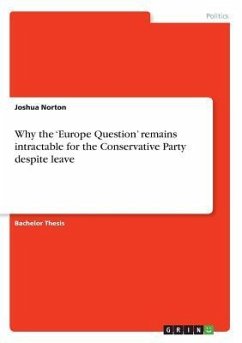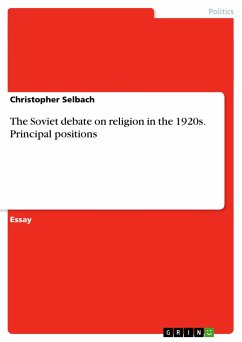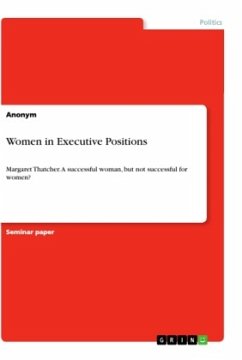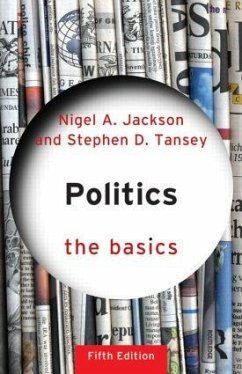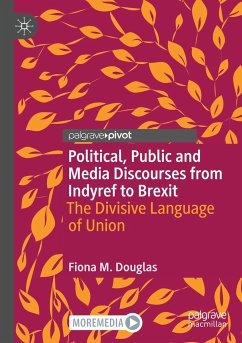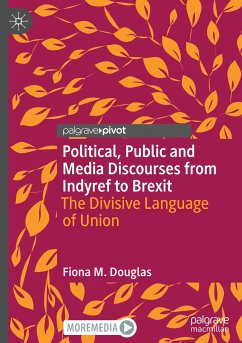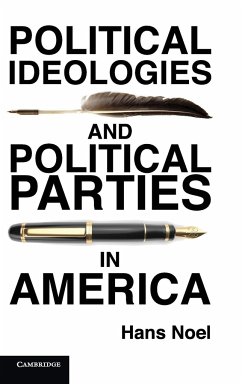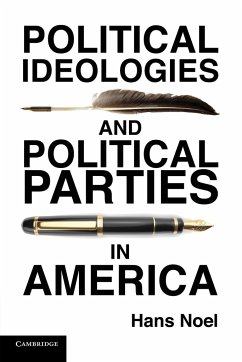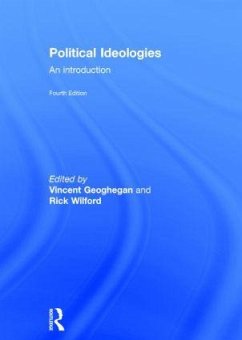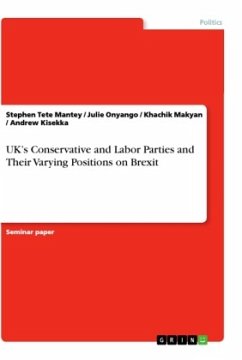
UK's Conservative and Labor Parties and Their Varying Positions on Brexit
Versandkostenfrei!
Versandfertig in 1-2 Wochen
17,95 €
inkl. MwSt.

PAYBACK Punkte
0 °P sammeln!
Seminar paper from the year 2020 in the subject Politics - International Politics - Region: Western Europe, grade: 1.3, University of Erfurt (Willy Brandt School of Public Policy), course: Public Policy, language: English, abstract: The research question covered in the paper is the following: to what extent do Labor and Conservative parties differ on Brexit? To answer the following question, we are going to adopt the theoretical framework of partisan politics, which would hopefully enable us to reveal the policy preferences of both parties, scrutinize their perspectives and ultimately make com...
Seminar paper from the year 2020 in the subject Politics - International Politics - Region: Western Europe, grade: 1.3, University of Erfurt (Willy Brandt School of Public Policy), course: Public Policy, language: English, abstract: The research question covered in the paper is the following: to what extent do Labor and Conservative parties differ on Brexit? To answer the following question, we are going to adopt the theoretical framework of partisan politics, which would hopefully enable us to reveal the policy preferences of both parties, scrutinize their perspectives and ultimately make comparisons between them. The paper will start with a short theoretical framework explaining what party politics is and why it is relevant for the issue. Then we will have a short literature review and introduce our methodology. This will be followed by a brief historical background on the UK presence in the European Union and Brexit processes. After this, we will turn to our main analysis of Labor and Conservative parties. And at the end of the paper we will come up with conclusions and make some policy recommendations for parties concerned.On 23 June 2016, a national referendum was held in the United Kingdom (UK) with the following question: "Should the UK remain a member of the European Union (EU) or leave the EU?" Nearly 17,4 million citizens voted to leave and 16 million to remain, a margin of 1,269,501 votes. 3 years have passed since the referendum, and on 31st January 2020 it the UK left the European Union moving into a transition period. Delivering Brexit was not without controversies i.e. two Prime Ministers resigned, internal conflicts within the Conservative party were accentuated, Brexit Party was formed among others. This paper aims at shedding light on this issue from the UK's internal perspective. Considering the fact that the UK is a parliamentary democracy, where the political parties are the major actors defining the internal and external politics, our unit of analysis are political parties. From this perspective, it would appear reasonable to take the two biggest parties of the political arena and analyze their policies: the Labor party and the Conservative party. The selection of the two parties is conditioned by the fact that historically they have had the biggest share of votes and parliamentary seats and consequently formed the government and made the political decisions.



